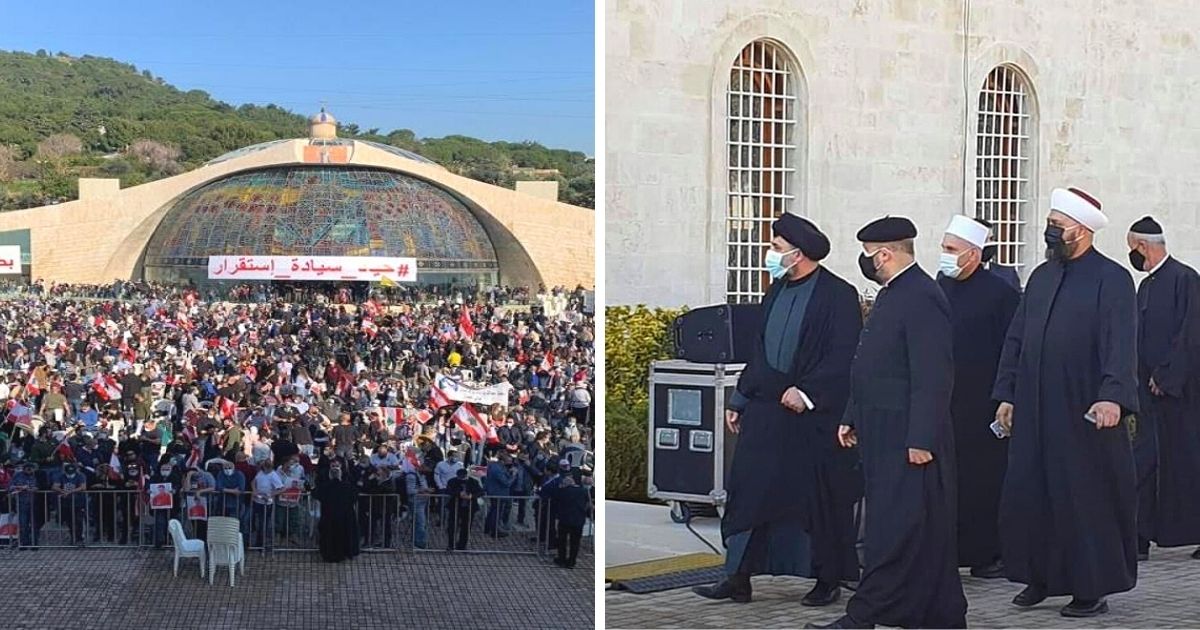A large number of people gathered outside of the Maronite Patriarchate in Bkerki, in a demonstration of solidarity with Patriarch Bechara Al-Rahi who called for an international conference to solve Lebanon’s multiple crises.
Clerics of various religions and sects attended as well, standing by the Maronite Patriarch in his national, all-inclusive call, which was nonetheless met with criticism from pro-Hezbollah people.
While Hezbollah is deemed an Iran-proxy in Lebanon, its partisans deemed the Patriarch call to be an invitation to the international “powers” to interfere in the country’s sovereignty.
However, Walid Ghayyad, the spokesman of the Bkerki rally, stressed that Saturday’s demonstrations are “not a political event” but mainly “aimed at supporting the patriarch’s patriotic vision that targets no one.”
Patriarch Bechara al-Rahi has been urging the Lebanese ruling officials to remove any sectarian barrier so that they can work together in a neutral manner to save the crippled country.
He proposed an UN-sponsored international conference to resolve Lebanon’s deepening political and economic crises while the leaders have been unable for months to agree on the formation of a government.
“Our proposal for an international conference came because we are unable to reach understanding, conduct any dialogue, or reach an agreement with each other,” the Maronite Patriarch said on Thursday.

“The international community is responsible for an effective and founding member of the United Nations and it must officially and seriously extend a hand of assistance,” the Patriarch added, reminding the world that Lebanon is a founding member of the U.N.
However, Grand Jaafarite Shiite Mufti Sheikh Ahmad Qabalan declined Al-Rahi’s proposal. He insisted on the formation of a Lebanese government without any interference or help from the international community.
“The solution starts and ends in Lebanon,” the Shiite Mufti responded on Friday, failing to acknowledge the reality of the long-dragging deadlock, with the officials unable to find any solution.
In his opinion, an international conference to help Lebanon means internationalization, which “means giving up our patriotic responsibilities.”
A debatable argument, considering the careless delays and disregards of the ruling officials to form a government and for the urgently needed reforms.
The Mufti even went cautioning his followers that an international conference would jeopardize the country’s independence and “push it to the abyss.”
The Shia Mufti’s statements concord with the TV speech of Hassan Nasrallah, leader of the Iran-backed Hezbollah earlier this month, and in which he stated, “Internationalization hurts Lebanon and complicates matters and it contradicts sovereignty and could be a cover for a new occupation.”
“What guarantees will be given to Lebanon amid the guarantees of the Big Powers to Israel?” he said.

However, people across Lebanon are aching for a solution that could bring them out of the long-lasting crises crippling the country.
The call of the Patriarch seemed to have resonated with many Lebanese of all religions, including the Shia community in different parts of the country.
Social media has been flooding with posts of support from multiple districts, including the Bekaa, Tripoli, and even Shia-predominant Nabatieh and Baalbek.
The peaceful demonstration in Bkerki marked also an emotional moment with the arrival of a crowd carrying posters of firefighters who were killed in the line of duty at the Beirut port on August 4th.
Received with applauses owed to heroes, that was a strong statement that supports the Patriarch’s call. The families of the victims have been awaiting justice in a country where politics have been hindering the investigation for close to 7 months now.
In his speech, Al-Rahi called for neutrality, emphasizing its citing in Lebanon’s declaration when it was formed, and pointing out that Lebanon’s ongoing sufferings are due to “the state’s veering away from the policy of neutrality.”
He urged the Lebanese to stand up against corruption and the chaos of the Beirut Blast investigation. He also pointed at the illegitimate weapons in the country, meaning Hezbollah military, stressing that the Lebanese army must take its rightful role in being the sole defender of Lebanon.
